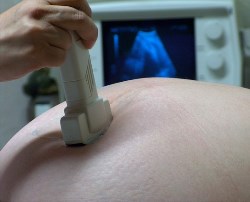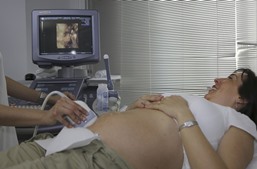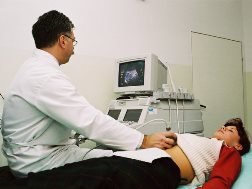How to Pick the Best Ultrasound Tech Training Program near South Range Wisconsin
 Once you have made a decision to pursue an ultrasound technician degree near South Range WI, the next step is to begin the process of picking a college. First, you must find the ideal program that will provide the proper training to become a qualified professional. And since a number of states do require that sonographers be either certified or licensed, depending on where you will practice you may also need to be prepared to pass a licensing or certification examination. So it’s very important that you investigate each college so that you can evaluate and compare your alternatives. But exactly where does one start? A number of prospective students will start by looking for colleges that are within driving distance of their residences and then by comparing tuition. Naturally cost and location must be taken into account when arriving at a decision, but there are additional significant factors as well. For example, if the ultrasound technician schools have earned accreditation or if they offer internship programs. These and other qualifications will be covered more in depth later in this post. But to start with, let’s discuss what a sonogram tech does and the credentials and online education options that are available.
Once you have made a decision to pursue an ultrasound technician degree near South Range WI, the next step is to begin the process of picking a college. First, you must find the ideal program that will provide the proper training to become a qualified professional. And since a number of states do require that sonographers be either certified or licensed, depending on where you will practice you may also need to be prepared to pass a licensing or certification examination. So it’s very important that you investigate each college so that you can evaluate and compare your alternatives. But exactly where does one start? A number of prospective students will start by looking for colleges that are within driving distance of their residences and then by comparing tuition. Naturally cost and location must be taken into account when arriving at a decision, but there are additional significant factors as well. For example, if the ultrasound technician schools have earned accreditation or if they offer internship programs. These and other qualifications will be covered more in depth later in this post. But to start with, let’s discuss what a sonogram tech does and the credentials and online education options that are available.
Click Here to Get Free Information on Ultrasound Technician Schools!
Sonographer Occupation Description
 There are more than one professional titles for ultrasound techs (technicians). They are also called sonogram techs, diagnostic medical sonographers (or just sonographers) and ultrasound technologists. No matter what their title is, they all have the same basic job description, which is to implement diagnostic ultrasound procedures on patients. While a number of techs work as generalists there are specializations within the profession, for instance in pediatrics and cardiology. Most work in South Range WI clinics, hospitals, outpatient diagnostic imaging centers and even private practices. Routine daily work functions of an ultrasound technician may involve:
There are more than one professional titles for ultrasound techs (technicians). They are also called sonogram techs, diagnostic medical sonographers (or just sonographers) and ultrasound technologists. No matter what their title is, they all have the same basic job description, which is to implement diagnostic ultrasound procedures on patients. While a number of techs work as generalists there are specializations within the profession, for instance in pediatrics and cardiology. Most work in South Range WI clinics, hospitals, outpatient diagnostic imaging centers and even private practices. Routine daily work functions of an ultrasound technician may involve:
- Preserving records of patient case histories and specifics of each procedure
- Counseling patients by explaining the procedures and answering questions
- Readying the ultrasound machines for usage and then cleaning and re-calibrating them
- Escorting patients to treatment rooms and making them comfortable
- Operating equipment while minimizing patient exposure to sound waves
- Assessing results and determining need for further testing
Sonographers must routinely gauge the performance and safety of their machines. They also must adhere to a high ethical standard and code of conduct as medical practitioners. So as to maintain that level of professionalism and remain up to date with medical knowledge, they are mandated to complete continuing education training on a regular basis.
Sonogram Technician Degrees Offered
 Sonogram tech enrollees have the option to acquire either an Associate Degree or a Bachelor’s Degree. An Associate Degree will normally require about 18 months to 2 years to finish depending on the program and class load. A Bachelor’s Degree will take longer at up to four years to finalize. Another alternative for individuals who have previously obtained a college degree is a post graduate certificate program. If you have received a Bachelor’s Degree in any major or an Associate Degree in a relevant medical sector, you can instead choose a certificate program that will require only 12 to 18 months to complete. One thing to bear in mind is that most ultrasound technician schools do have a clinical training element as part of their curriculum. It often may be fulfilled by participating in an internship program which many schools organize with South Range WI clinics and hospitals. When you have graduated from any of the certificate or degree programs, you will then have to comply with the licensing or certification requirements in Wisconsin or whichever state you choose to practice in.
Sonogram tech enrollees have the option to acquire either an Associate Degree or a Bachelor’s Degree. An Associate Degree will normally require about 18 months to 2 years to finish depending on the program and class load. A Bachelor’s Degree will take longer at up to four years to finalize. Another alternative for individuals who have previously obtained a college degree is a post graduate certificate program. If you have received a Bachelor’s Degree in any major or an Associate Degree in a relevant medical sector, you can instead choose a certificate program that will require only 12 to 18 months to complete. One thing to bear in mind is that most ultrasound technician schools do have a clinical training element as part of their curriculum. It often may be fulfilled by participating in an internship program which many schools organize with South Range WI clinics and hospitals. When you have graduated from any of the certificate or degree programs, you will then have to comply with the licensing or certification requirements in Wisconsin or whichever state you choose to practice in.
Ultrasound Tech Online Classes
 As earlier discussed, nearly all ultrasound tech schools have a clinical requirement to their programs. So although you can earn a degree or certificate online, a substantial portion of the training will be either conducted in an on-campus laboratory or at an approved off campus facility. Practical training can typically be satisfied through an internship at a local South Range WI hospital, outpatient clinic or private practice. However the balance of the classes and training may be attended online in your South Range home. This is particularly beneficial for those students that keep working while getting their degrees. Plus online schools are frequently less expensive than traditional options. Expenses for commuting and study materials may be decreased also. But similarly as with every sonography program you are considering, confirm that the online program you select is accredited. One of the most highly respected accrediting agencies is the Commission on Accreditation of Allied Health Education Programs (CAAHEP). Accreditation is particularly significant for certification, licensing and job placement (more on accreditation later). So if you are disciplined enough to attend classes away from the classroom in the comfort of your own home, then an online school may be the ideal option for you.
As earlier discussed, nearly all ultrasound tech schools have a clinical requirement to their programs. So although you can earn a degree or certificate online, a substantial portion of the training will be either conducted in an on-campus laboratory or at an approved off campus facility. Practical training can typically be satisfied through an internship at a local South Range WI hospital, outpatient clinic or private practice. However the balance of the classes and training may be attended online in your South Range home. This is particularly beneficial for those students that keep working while getting their degrees. Plus online schools are frequently less expensive than traditional options. Expenses for commuting and study materials may be decreased also. But similarly as with every sonography program you are considering, confirm that the online program you select is accredited. One of the most highly respected accrediting agencies is the Commission on Accreditation of Allied Health Education Programs (CAAHEP). Accreditation is particularly significant for certification, licensing and job placement (more on accreditation later). So if you are disciplined enough to attend classes away from the classroom in the comfort of your own home, then an online school may be the ideal option for you.
Subjects to Ask Sonogram Tech Programs
 Once you have determined the type of degree or certificate that you would like to earn, you can initiate the procedure of assessing and comparing ultrasound tech schools. You will first probably want to choose whether you will attend classes online or travel to a college campus in the South Range WI area. Naturally location will be significant if you select the latter, and the price of tuition undoubtedly will be an initial qualification as well. But there are other factors that you should also take into account, for instance if the programs are accredited and if they sponsor internships. So in order to carry out your due diligence so that you can make your ultimate selection, below are several questions that you need ask each sonographer school before deciding.
Once you have determined the type of degree or certificate that you would like to earn, you can initiate the procedure of assessing and comparing ultrasound tech schools. You will first probably want to choose whether you will attend classes online or travel to a college campus in the South Range WI area. Naturally location will be significant if you select the latter, and the price of tuition undoubtedly will be an initial qualification as well. But there are other factors that you should also take into account, for instance if the programs are accredited and if they sponsor internships. So in order to carry out your due diligence so that you can make your ultimate selection, below are several questions that you need ask each sonographer school before deciding.
Are the Ultrasound Tech Programs Accredited? Most sonogram tech schools have obtained some form of accreditation, whether national or regional. Nevertheless, it’s still important to verify that the program and school are accredited. Among the most highly respected accrediting organizations in the field of sonography is the Joint Review Committee on Education in Diagnostic Medical Sonography (JRC-DMS). Programs receiving accreditation from the JRC-DMS have undergone a detailed evaluation of their instructors and course materials. If the program is online it might also obtain accreditation from the Distance Education and Training Council, which focuses on online or distance education. All accrediting agencies should be recognized by the U.S. Department of Education or the Council on Higher Education Accreditation. Besides ensuring a superior education, accreditation will also help in obtaining financial assistance and student loans, which are frequently not available for non-accredited colleges. Accreditation might also be a pre-requisite for licensing and certification as required. And many South Range WI health facilities will only hire graduates of an accredited program for entry-level openings.
Are Internships Offered? Find out if the sonogram tech schools you are evaluating have associations with South Range WI clinics or hospitals for internship programs. Not only are internships an excellent manner to obtain hands on experience in a clinical environment, they are also a way to satisfy the clinical training requirement for the majority of programs. As an ancillary benefit, they may assist students and graduates develop professional relationships in the South Range medical community and help with job placement.
Is Job Placement Help offered? You will most likely want to secure employment quickly after graduation, but finding that first job in a new profession can be challenging without help. Find out if the sonographer schools you are interviewing have job placement programs and what their placement rates are. High and rapid placement rates are an excellent indication that the schools have sizable networks and good relationships with Wisconsin healthcare employers. It also substantiates that their students are well regarded and sought after.
Where is the Program Located? For a number of students, the college they pick will have to be within commuting distance of their South Range WI home. Students who have chosen to attend online classes obviously will not have to trouble themselves with the location of the campus. However, the availability of local internships will be of importance. Something to keep in mind is that if you choose to enroll in a college that is out of state or perhaps out of your local area, you may have to pay a higher tuition. State colleges commonly charge higher tuitions for out of state residents. And community colleges generally charge a higher tuition for those students that live outside of their districts.
What are the Class Sizes ? Unless you are the kind of person that prefers to sit far in the rear of class or get lost in the crowd, you will probably prefer a smaller class size. Smaller classes allow for more individual participation and one-on-one instruction. Ask the schools you are considering what the typical student to teacher ratio is for their classes. If practical you may want to sit in on one or more classes before making your final decision. This will also give you an opportunity to speak with some of the instructors and students to get their perspectives regarding the sonogram technician program also.
Does the College Accommodate your Schedule? And last you must confirm that the sonographer program you ultimately choose can furnish the class schedule you need. This is particularly important if you decide to continue working while you attend classes. If you need to schedule evening or weekend classes in the South Range WI area, make certain that they are offered. If you can only attend part-time, verify if that is an option and how many credit hours or courses you would have to carry. Also, ask what the procedure is for making up any classes that you may miss as a result of work, illness or family emergencies.
Obstetric Ultrasound Technician Schools South Range Wisconsin
 Picking the right ultrasound technician certificate or degree program is an important first step to commencing a rewarding new profession delivering diagnostic services to patients. Ultrasound technician schools require that you have earned a high school diploma or equivalent. Along with satisfying academic standards, you must be in at least fairly good physical condition, able to stand for prolonged durations with the ability to regularly lift weights of fifty pounds or more, as is it frequently necessary to position patients and move heavy machines. Additional helpful talents include technical proficiency, the ability to stay levelheaded when faced with an angry or anxious patient and the ability to communicate clearly and compassionately. You originally came to this website due to an interest in Obstetric Ultrasound Technician Schools and wanting more information on Sonography Certificate. However, as we have covered in this article, there are multiple questions that you need to ask each program you are considering. This is the case whether you select an online degree or drive to the college campus to attend classes. And by asking the proper questions so that you can evaluate each school, you can narrow down your options until you are left with the ideal program for your education. And with the proper training, discipline and motivation to succeed, you can achieve your goal to work as an sonographer in South Range WI.
Picking the right ultrasound technician certificate or degree program is an important first step to commencing a rewarding new profession delivering diagnostic services to patients. Ultrasound technician schools require that you have earned a high school diploma or equivalent. Along with satisfying academic standards, you must be in at least fairly good physical condition, able to stand for prolonged durations with the ability to regularly lift weights of fifty pounds or more, as is it frequently necessary to position patients and move heavy machines. Additional helpful talents include technical proficiency, the ability to stay levelheaded when faced with an angry or anxious patient and the ability to communicate clearly and compassionately. You originally came to this website due to an interest in Obstetric Ultrasound Technician Schools and wanting more information on Sonography Certificate. However, as we have covered in this article, there are multiple questions that you need to ask each program you are considering. This is the case whether you select an online degree or drive to the college campus to attend classes. And by asking the proper questions so that you can evaluate each school, you can narrow down your options until you are left with the ideal program for your education. And with the proper training, discipline and motivation to succeed, you can achieve your goal to work as an sonographer in South Range WI.
More Ultrasound Locations in Wisconsin
Wi-Fi
Wi-Fi (/ˈwaɪfaɪ/)[1] is a family of radio technologies that is commonly used for the wireless local area networking (WLAN) of devices which is based around the IEEE 802.11 family of standards. Wi‑Fi is a trademark of the Wi-Fi Alliance, which restricts the use of the term Wi-Fi Certified to products that successfully complete interoperability certification testing.[2][better source needed] Wi-Fi uses multiple parts of the IEEE 802 protocol family and is designed to seamlessly interwork with its wired sister protocol Ethernet.
Devices that can use Wi-Fi technologies include desktops and laptops, smartphones and tablets, smart TVs, printers, digital audio players, digital cameras, cars and drones. Compatible devices can connect to each other over Wi-Fi through a wireless access point as well as to connected Ethernet devices and may use it to access the Internet. Such an access point (or hotspot) has a range of about 20 meters (66 feet) indoors and a greater range outdoors. Hotspot coverage can be as small as a single room with walls that block radio waves, or as large as many square kilometres achieved by using multiple overlapping access points.
The different versions of Wi-Fi are specified by various IEEE 802.11 protocol standards, with the different radio technologies determining the ranges, radio bands, and speeds that may be achieved. Wi-Fi most commonly uses the 2.4 gigahertz (12 cm) UHF and 5 gigahertz (6 cm) SHF ISM radio bands; these bands are subdivided into multiple channels. Each channel can be time-shared by multiple networks. These wavelengths work best for line-of-sight. Many common materials absorb or reflect them, which further restricts range, but can tend to help minimise interference between different networks in crowded environments. At close range, some versions of Wi-Fi, running on suitable hardware, can achieve speeds of over 1 Gb/s (Gigabit per second).
Business Results 1 - 10 of 1


